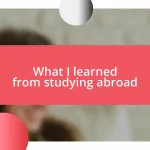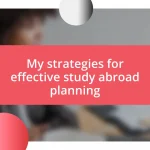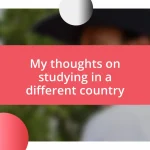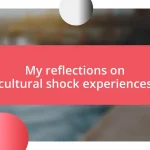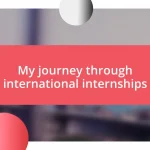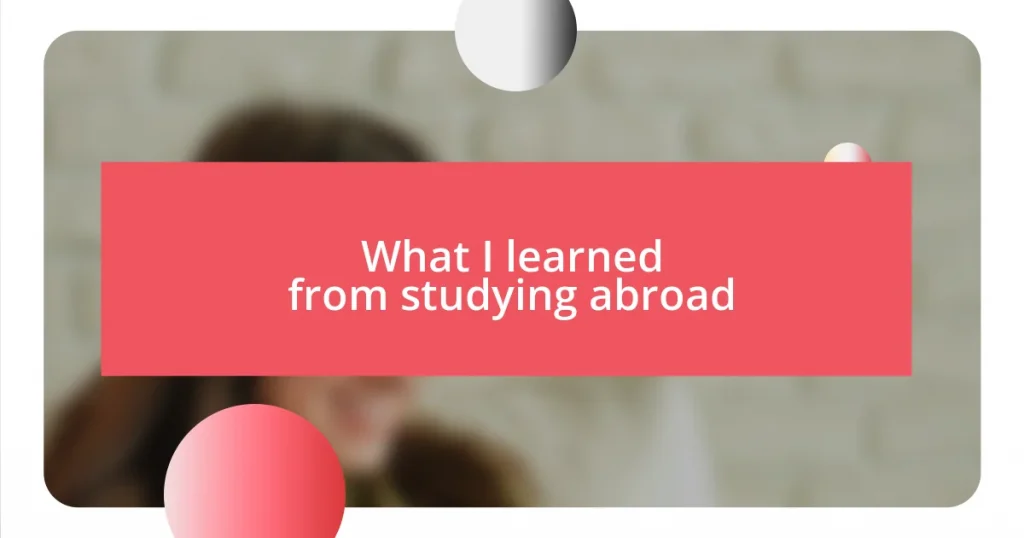Key takeaways:
- Studying abroad fosters emotional growth, resilience, and independence through unique cultural experiences and overcoming challenges.
- Key skills gained include adaptability, enhanced communication, and critical thinking, essential for both personal and professional development.
- Building a global network and cultural appreciation enriches perspectives, leading to lifelong connections and career advantages in a multicultural job market.
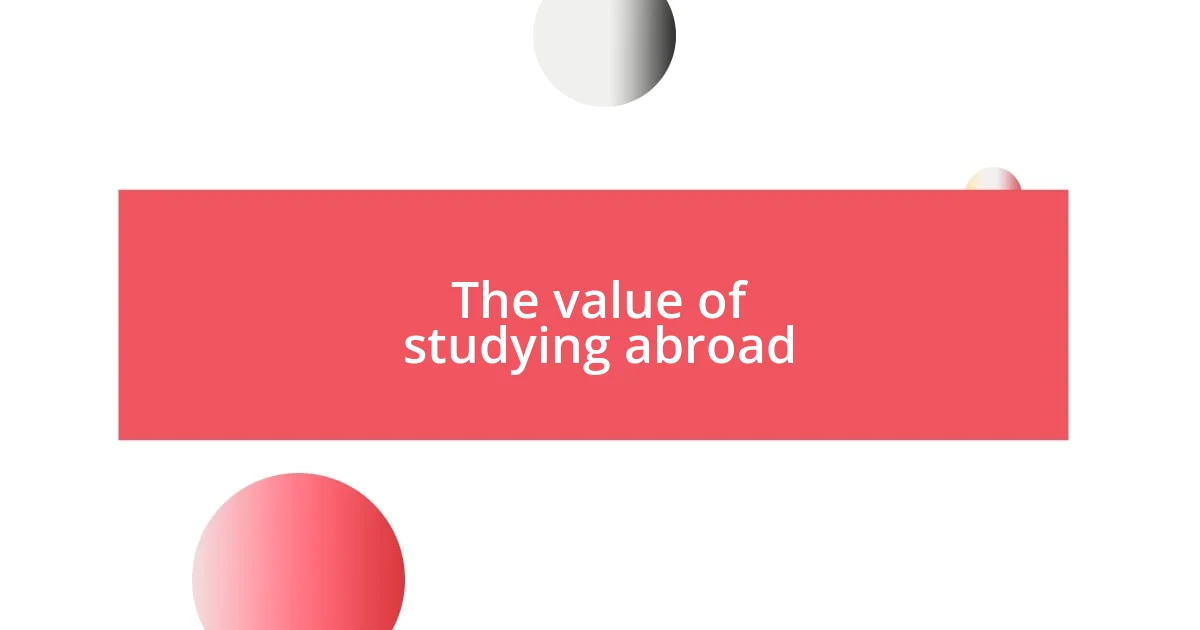
The value of studying abroad
Studying abroad has a unique way of expanding your horizons. I still remember the thrill of walking through the bustling streets of Barcelona, realizing that every corner held a story. It wasn’t just about academics; it was about experiencing a different culture that challenged my perceptions and made me rethink my worldview.
The emotional growth I experienced while living overseas was profound. I’ll never forget the overwhelming sense of homesickness that hit me one rainy evening. But in that moment, I learned resilience and independence, which I now see as essential skills in navigating life’s challenges. Have you ever faced a moment where you felt lost, only to find your strength within?
Furthermore, the friendships I formed during my time abroad have been invaluable. One late-night conversation with a fellow student from Thailand opened my eyes to perspectives I had never considered. This connection fostered a sense of global citizenship within me, reminding me that we’re all more alike than we might think, despite our different backgrounds. How has your own network shaped your perspective on the world?
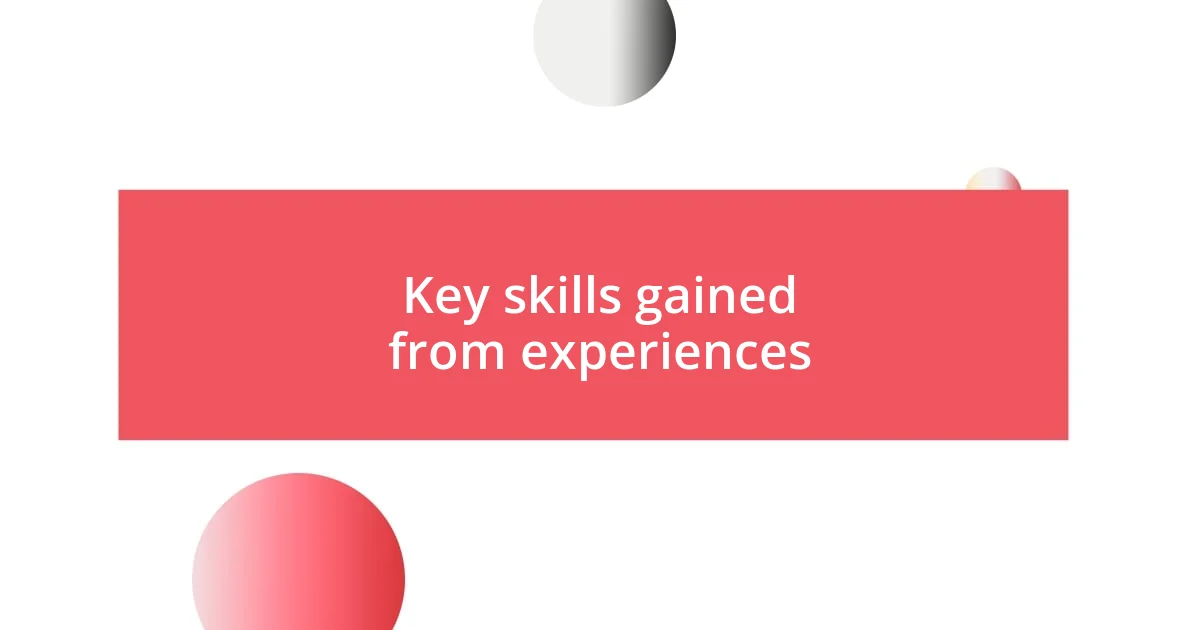
Key skills gained from experiences
Experiences during my time abroad taught me the importance of adaptability. I remember a particularly challenging week when my classes shifted to a new format unexpectedly. Initially, I felt overwhelmed, but I quickly learned to adjust my study techniques. This flexibility is now something I value deeply, as it helps me navigate changes in both personal and professional life with confidence.
Another key skill gained was enhanced communication. Engaging with people from various cultures required me to rethink my approach to conversations. I vividly recall a misunderstanding during a group project with students from different countries. We had to find a common ground; through that experience, I learned the power of active listening and the importance of asking clarifying questions, which have become integral to my interactions today.
Critical thinking also emerged as a significant takeaway. An assignment I had while studying in Italy involved analyzing local policies on sustainability. This pushed me to research deeply and think critically about real-world issues. Over time, I realized that this skill is crucial not only in academic settings but also in making informed decisions about everyday challenges.
| Skill | Description |
|---|---|
| Adaptability | Learning to adjust to new environments and unexpected changes effectively. |
| Communication | Enhanced ability to convey ideas clearly and understand different perspectives. |
| Critical Thinking | Developing an analytical approach to problem-solving and making informed decisions. |
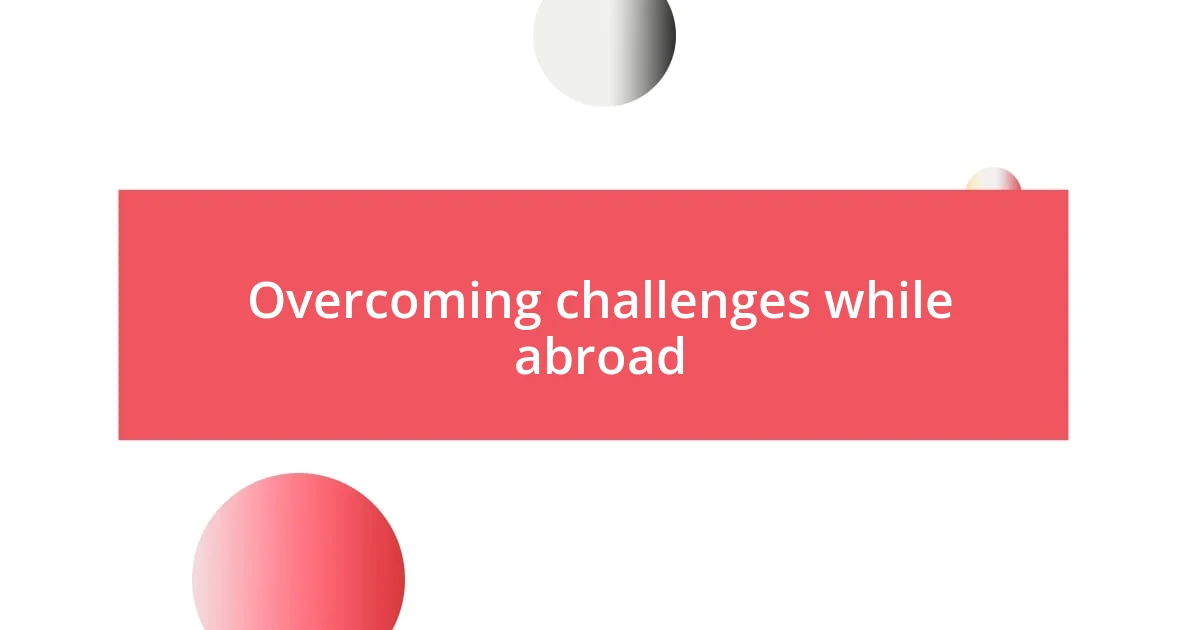
Overcoming challenges while abroad
Navigating the challenges of studying abroad often felt like stepping into uncharted territory. One constant hurdle was the language barrier. I remember standing at a café, trying to order a simple croissant, only to end up with a complex dish I had never seen before. This experience, while humorous in hindsight, taught me the power of non-verbal communication and perseverance. It pushed me to embrace mistakes as learning opportunities, which became a cornerstone of my journey.
Here are a few key challenges I faced and how I overcame them:
- Cultural Differences: Initially, I struggled to understand local customs. Observing and asking questions helped me adapt and appreciate these differences.
- Homesickness: The longing for home was often overwhelming. I started creating a routine that included video calls to family, which gave me comfort and connection.
- Classroom Dynamics: Adapting to diverse teaching styles took time. I learned to engage openly with professors and peers, which enriched my understanding and built my confidence.
In overcoming these challenges, I grew not only in knowledge but also in strength and empathy. Each obstacle became a stepping stone towards self-discovery and greater resilience.
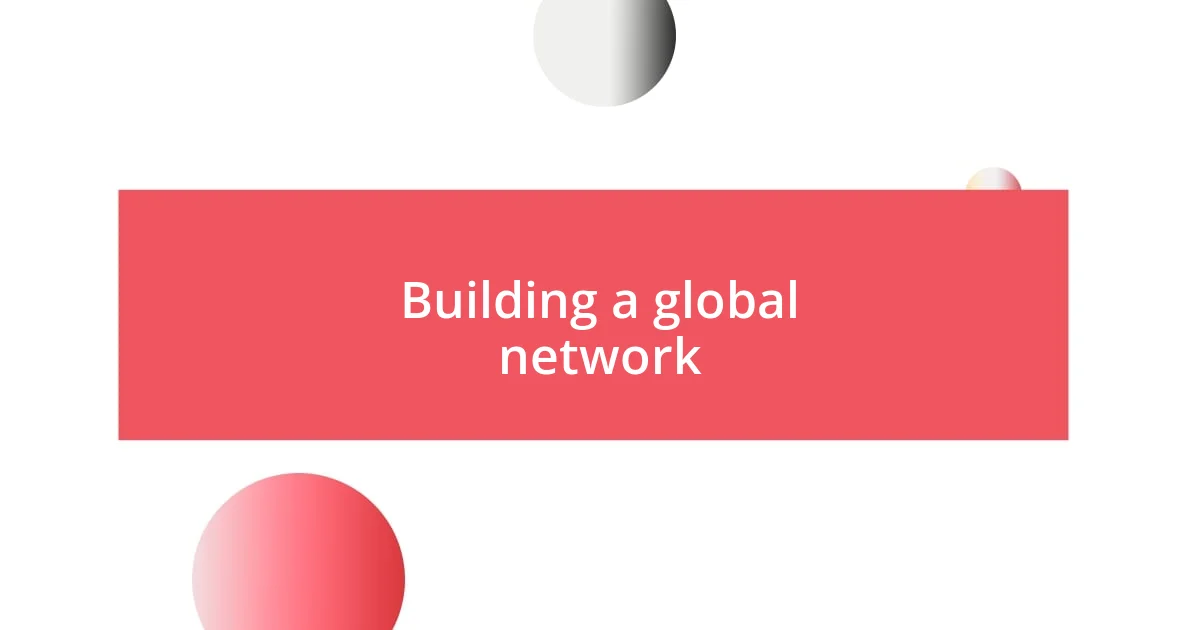
Building a global network
Building a global network is one of the most rewarding aspects of studying abroad. I’ll never forget the diverse group of friends I made during my time in Spain. We came from completely different backgrounds, yet we bonded over shared experiences like late-night study sessions and weekend trips. Each friendship opened doors to new perspectives, helping me see the world through various lenses.
What really struck me, though, was the opportunity to connect with professionals in my field. At a networking event hosted by my university, I met an industry leader who later became a mentor. This connection not only provided valuable career guidance but also taught me the significance of nurturing relationships across borders. Have you ever had a mentor shape your path in unexpected ways? I certainly did, and it made all the difference in my journey.
Building this global network isn’t just about having connections; it’s about cultivating friendships that span continents. I still keep in touch with my classmates, sharing updates, celebrating achievements, and supporting each other during challenging times. This ongoing network creates a sense of belonging, showing that even when we’re miles apart, we’re never truly alone in our professional journeys.
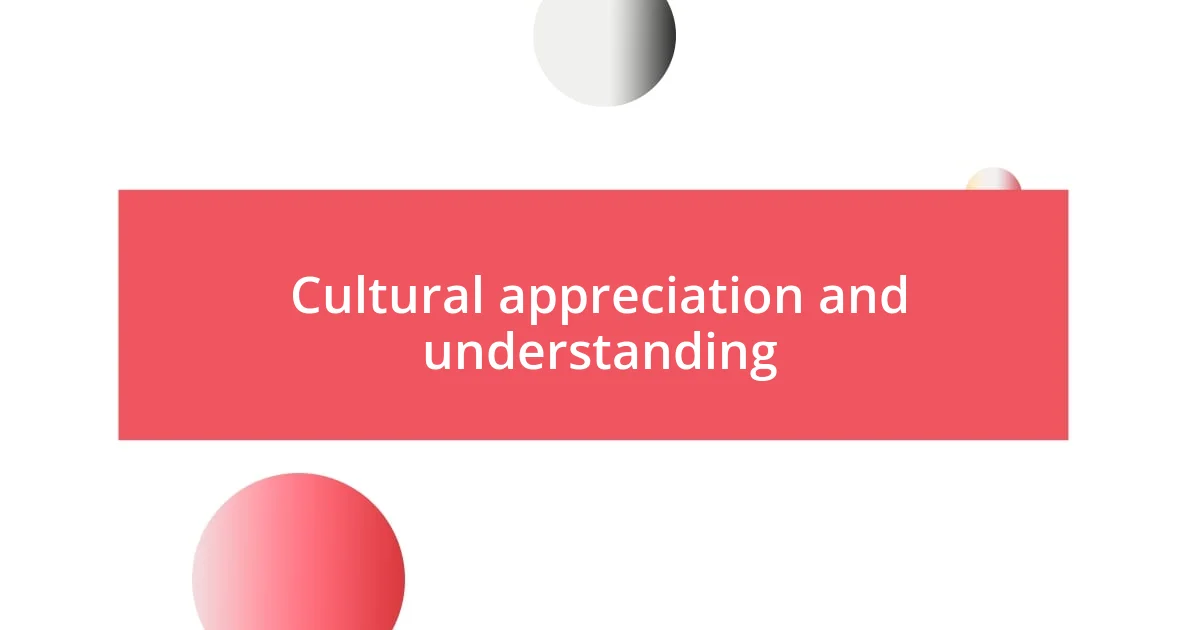
Cultural appreciation and understanding
Cultural appreciation and understanding blossomed during my time abroad in ways I never anticipated. One unforgettable moment for me was participating in a traditional festival, where I found myself swept along with the locals in a vibrant celebration filled with music, dancing, and delicious food. It was exhilarating to experience this communal joy first-hand, reminding me that culture is not just something we observe; it’s something we live and feel deeply.
The more I delved into the local culture, the more my perspectives shifted. I recall a discussion I had with a fellow student about the significance of family in our respective cultures. It dawned on me how our shared values could unite us, despite differences in traditions and practices. This reality struck a chord and made me question: how often do we make assumptions about others without understanding their backgrounds? Recognizing the nuances of different cultures has encouraged me to approach conversations with curiosity rather than judgment.
As I immersed myself in new customs, I developed a deeper respect for diversity. I remember trying my hand at cooking a local dish with a host family, fumbling through the recipe while laughing together. Each ingredient felt like a bridge connecting me to their history and way of life. This hands-on experience taught me that cultural appreciation requires more than superficial engagement; it demands genuine interest and a willingness to embrace the unknown. What has been your most eye-opening experience with another culture? It’s these moments that enrich our lives and create lasting connections.
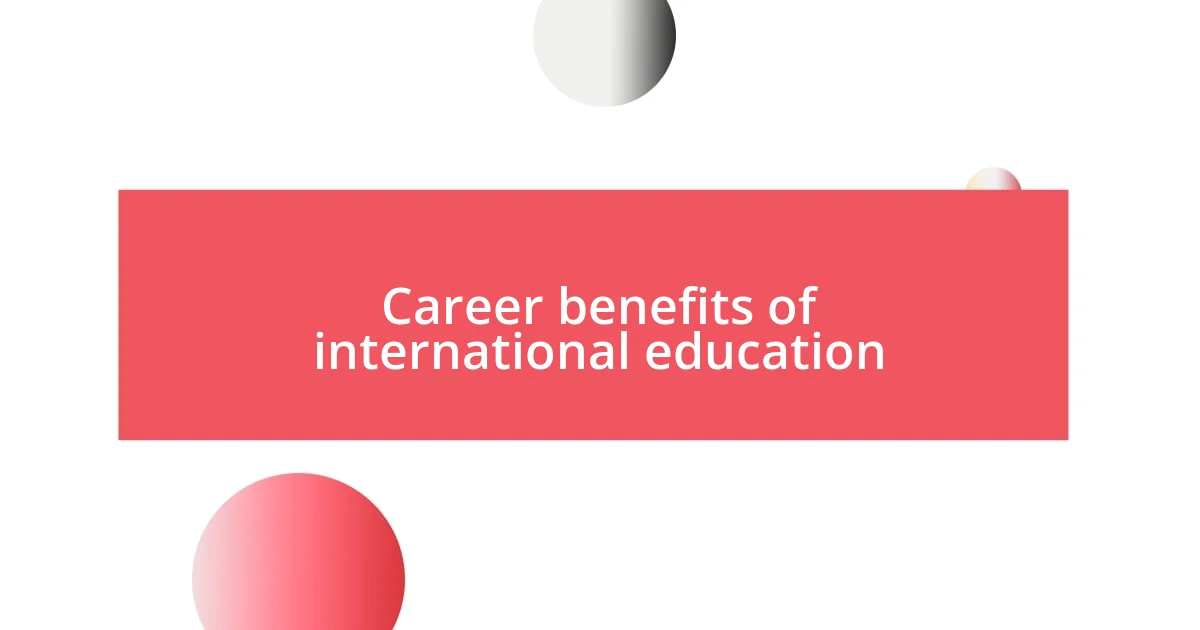
Career benefits of international education
One significant career benefit of international education is the development of transferable skills. During my time abroad, I faced numerous challenges, from navigating a foreign job market to tackling language barriers. Each experience honed my adaptability and problem-solving abilities, qualities that employers highly value. Have you ever found yourself in a situation that forced you to think on your feet? I certainly did, and it reshaped my approach to challenges in the workplace.
Another perk I found was gaining a competitive edge in the job market. I remember applying for internships back home and being asked about my time abroad. Sharing stories about leading diverse group projects and collaborating with international teams made my resume stand out. Employers are increasingly seeking candidates who can thrive in multicultural environments. How do you think your experiences could give you that same advantage?
Additionally, my global experience enhanced my communication skills. I vividly recall participating in class discussions where ideas flowed from various perspectives. This not only improved my ability to articulate thoughts but also taught me to listen actively and consider viewpoints outside my own. In today’s interconnected world, being able to communicate effectively across cultures is a tremendous asset. Isn’t it fascinating how the simplest interactions can lead to profound growth in our professional lives?
